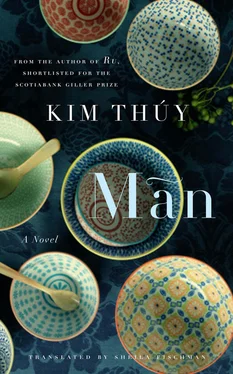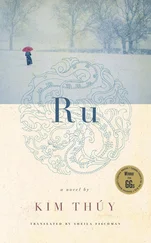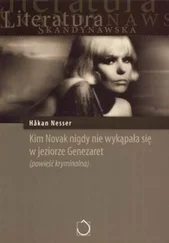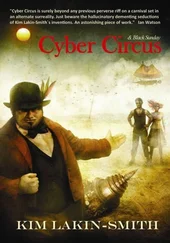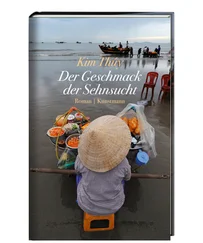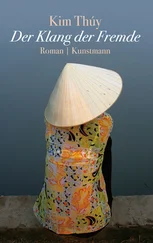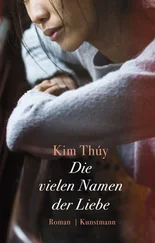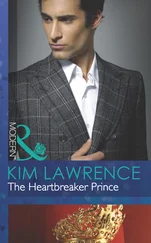As for him, he never criticized me for spending too long in the kitchen, any more than he questioned me about my choices for the children’s education. My husband and I were advancing along a road as smooth and level as a landing strip.
tóc

hair
LIKE LUC, I HAD A perfect marriage until he smoothed my hair with the backs of his hands and breathed in the side of my neck, asking me not to move or he would fall, he would scream. The only trace of Luc that I could bring back to Montreal was that of his hands on my eyes, which he had covered so that I wouldn’t see his tears flow silently in the airport parking lot. I stood there in front of him, motionless, overcome by a shock of emotions so foreign to me. He had watched me cross the security line, leave with no date and no promise of return.
thở

breathe
I LEARNED TO CONTROL my breathing, to need very little oxygen, like mountain dwellers and those who lived in the Củ Chi tunnels during the war. When Maman and I were living in a room assigned by the government in Hanoi, we slept with a towel over our noses so we wouldn’t be wakened by the foul smells that came out of the walls like putrid monsters. In those days, I exhaled more than I inhaled, but I never suffocated. Through the window, appearing and disappearing in the clouds, the image of the fullness of Luc’s shoulder under his violet shirt, of his strong wrist with a red string around it or of his curls that spilled out of his helmet sucked up all the air in my lungs and made the enclosed space of the airplane stifling, unbearable.
lụa

silk
ASIDE FROM THE NAIL clipper he kept permanently in his trouser pocket that I’d used on his sons in his mother’s garden, I still knew nothing about this man who had suddenly become the centre of my universe, though I had neither centre nor universe. I may have been mistaken to have mocked people who believe in the story of Saint Ông Tơ, whose role is to bind two persons with love by twining two red silk threads together between his fingers. Maybe Luc was the red thread intended for me?
And perhaps he was right after all, the young student Alexandre, a customer suffering from heartbreak who’d sworn to me one day that he would never love another and had upheld his conviction by clipping onto a cord in the window this quotation from Roland Barthes: “I encounter millions of bodies in my life; of those millions I may desire hundreds; but of those hundreds I love only one.” At the time, that sentiment was utterly foreign and incomprehensible to me because I had never experienced that sensation of exclusivity and uniqueness.
sân bay

airport
I AM CERTAIN THAT not one passenger had noticed Maman in the crowd in front of the sliding doors on the way out of Customs. To me, she looked particularly thin and old. She seemed to have reached a threshold where she let herself be lulled by time, not in an attitude of surrender but tenderly, as if they were confiding in one another and poking affectionate fun at the whirlwind of youth. Maman stroked the ends of my hair three times, as she’d always done when she came to pick me up from my babysitter. When my hair was short or tied back, I could feel the warmth of her hand on my back, tiny but powerful, like a healer’s. I found myself doing the same to my own children when they got off the school bus in front of the house, after a week-long absence. The contrast between the minimalism of my action and the spontaneous affection of Luc’s children, who had held me in their arms for an eternity to say goodbye, stunned me.
bảo hiểm

insurance
THE CLOSENESS BETWEEN MY children and Julie has always reassured me. They kissed, embraced, murmured secrets and sweet nothings. Julie took them regularly to concerts, where the conductor would show them how to listen to the instruments to hear the voices of the characters in the stories told in music. She signed them up for hockey, swimming, ballet and drawing. She decided, with my daughter, on her hairstyles: shoulder-length, medium, bangs, no bangs. My children knew Julie’s phone number by heart and called her Má Hai , Mother Two.
In a family, “Two” expresses the highest rank, and Julie occupied that place because she was older than me, because she was my big sister. Often, the aunts in a family are called “mother” because they have nearly the same duties and the same rights concerning the well-being and education of the child. As soon as Julie came along to guide them, correct them, entertain them, I stepped aside so the relationship between them could deepen and exist without me, after me. In Vietnam, it is said that the fatherless child still eats rice and fish while the motherless child must spread leaves on the ground for sleeping ( Mồ côi Cha ăn cơm với cá; mồ côi Mẹ lót lá mà nằm ). My children were very lucky. They had life insurance and mother insurance.
tim

heart
I ALSO THANKED PHILIPPE for telling them constantly, “I love you,” with hearts drawn, moulded, written on almond tuiles , marshmallows, jujubes or mousse au chocolat . My children copied him, spontaneously signing their drawings and cards with hearts, while none of the letters I’d written to Maman contained the three words “I miss you” or mentioned that I suffered from her absence. I had described to her the staggering number of shampoo brands in just one store because I hoped to pour water over her soapy hair again while she bent her head over the aluminum basin that we used for washing clothes.
I had sent her a map of the Metro, explaining the speed of a train plunging into the dark tunnels as precisely as a bullet down the length of the barrel because I preferred the slowness of our train, so slow that we could nearly touch the lives of people who lived near the tracks. The passengers complained at the narrowness of the berths, even in first class, because there were six of us in each compartment. The last berths were attached some thirty centimetres from the ceiling, barely enough room to slip inside. Once, a fat woman had settled in above us, her stomach nearly touching the ceiling. I was terribly afraid that the Formica sheet would break and the woman would land on us, sleeping just underneath. My anxiety soon faded because I was happy to be curled up against Maman. With my nose pressed against the wall, my back covered by her warmth, my head against her heart, I slept the sweetest and deepest of sleeps. Maman thought I must lack air in that limited space, yet I’d never been so alive as during those rare journeys by train, when she protected me against passengers with roaming hands, where she offered me lightness, where she had reduced life and the entire world to a single bubble.
I no longer witnessed, in the window of the house our train nearly touched, the father who threw an iron at his daughter’s face because she had on too much makeup. I was no longer listening to the conversation of the two men next to me, reminiscing about their student years in the former Czechoslovakia, how they’d made money clandestinely selling goods that had been rationed. I had stopped counting the cockroaches that zoomed over the walls or wondering if the pink polyester satin pillow, edged with a lot of gathered, dusty flounces, provided by the train, had assembled the entire population of lice in the country. Enclosed in here, I could rest, let myself go and relinquish the millions of details in the world around me. I dismissed everything, knew nothing as soon as I was lying spoon-fashion with Maman.
Читать дальше
